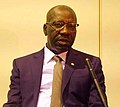| Governor of Edo State | |
|---|---|
 Seal of Edo State of Nigeria | |
 Flag of Edo State of Nigeria | |
since 12 November 2024 | |
| Government of Edo State | |
| Style |
|
| Type | Head of state Head of government |
| Member of | Edo State Executive Branch National Economic Council |
| Reports to | President of Nigeria |
| Residence | Government House, Benin City [1] |
| Seat | Benin City |
| Appointer | Popular vote |
| Term length | Four years, renewable once consecutively |
| Constituting instrument | Constitution of Nigeria |
| Inaugural holder | John E.K Odigie-Oyegun |
| Formation | 27 August 1991 |
| Deputy | Deputy Governor of Edo State |
Edo State, situated in Nigeria's southern region, has had various leaders since Nigeria gained independence in 1960, both military and civilian. After independence, Nigeria had only three regions, and the area of the future Edo State was located in the Western Region. The Mid-Western Region was separated from the Western Region in August 1963 and had Dennis Osadebay as its initial Premier. Osadebay served until January 1966, when he was replaced by David Akpode Ejoor, the first military governor. Control of the region was contested during the Biafran War (1967–1970), and Ejoor was replaced by Samuel Ogbemudia. Ogbemudia governed the Mid-Western State from September 1967 to July 1975. The region was renamed and reorganized as the Bendel State on 17 March 1976, its name a combination of the old Benin and Delta provinces. Notable governors during this time period include George Agbazika Innih, Husaini Abdullahi, and Ambrose Folorunsho Alli. Ogbemudia also returned for a three-month stint as a civilian governor in 1983 before the military reasserted control.
Contents
- List of governors
- Western Region
- Mid-Western Region
- Bendel State
- Edo State
- See also
- Notes
- References
- Citations
- Sources
The modern Edo state was established on 27 August 1991, following the division of Bendel State into Edo State and Delta State. John Odigie-Oyegun became the first civilian governor of Edo State from January 1992 to November 1993, followed by military governors. In the democratic era, Lucky Igbinedion served from 1999 to 2007, and was succeeded by Oserheimen Osunbor. Adams Oshiomhole served from 2008 to 2016, followed by Godwin Obaseki, who was re-elected in 2020. Monday Okpebholo is has been incumbent since 2024.



